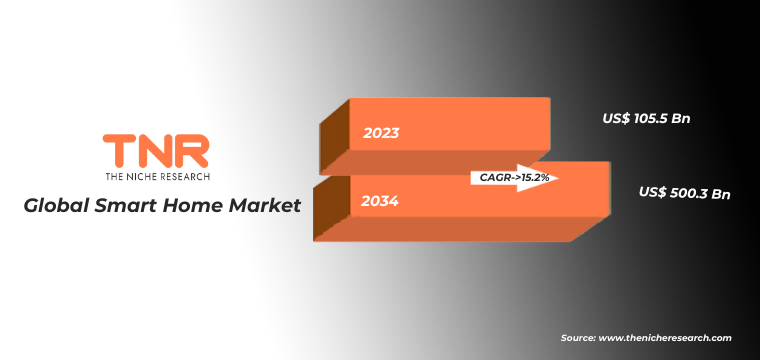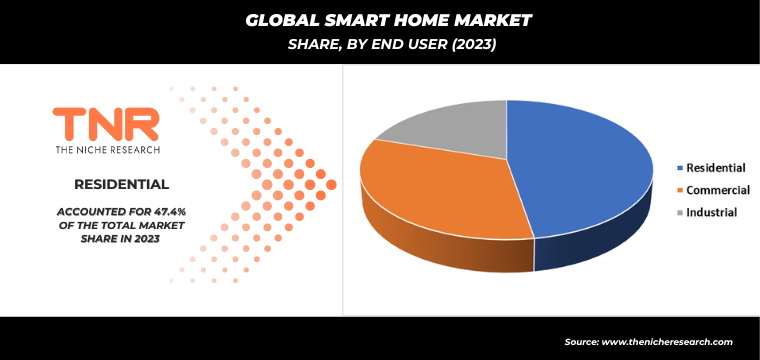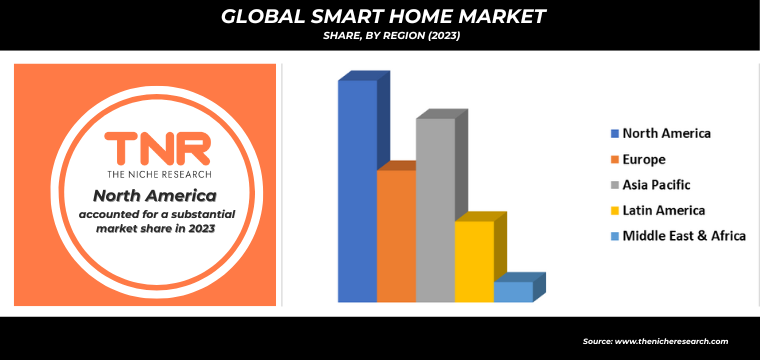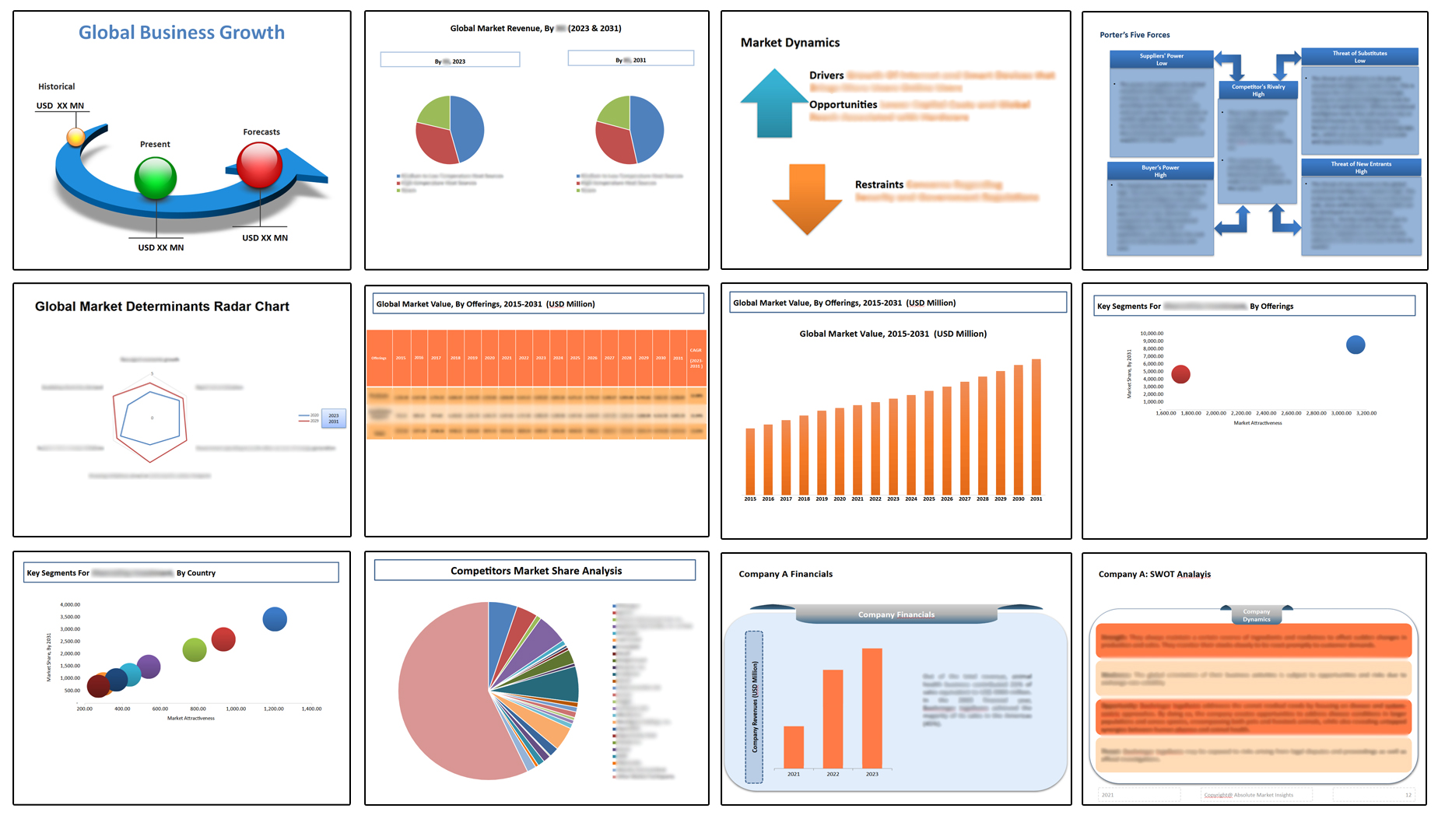Global Smart Home Market: By Product Type, By Technology, By End User, By Region & Segmental Insights Trends and Forecast, 2024 – 2034
- Industry: Technology
- Report ID: TNR-110-1140
- Number of Pages: 420
- Table/Charts : Yes
- June, 2024
- Base Year : 2024
- No. of Companies : 10+
- No. of Countries : 29
- Views : 10202
- Covid Impact Covered: Yes
- War Impact Covered: Yes
- Formats : PDF, Excel, PPT
Smart homes refer to residences equipped with interconnected devices and systems that automate and optimize various aspects of daily living through advanced technology. These devices, often equipped with sensors, actuators, and connectivity features, enable homeowners to remotely monitor, control, and automate functions such as lighting, heating, security, entertainment, and appliances. Smart home ecosystems typically include a variety of devices, such as smart thermostats, lighting systems, surveillance cameras, door locks, voice assistants, and entertainment systems, all integrated into a cohesive network.
Through smartphone apps, voice commands, or centralized control hubs, residents can customize settings, create schedules, and receive alerts or notifications. Smart home technology offers numerous benefits, including enhanced convenience, energy efficiency, security, and comfort. Additionally, it enables greater accessibility and independence for individuals with disabilities or elderly residents, allowing them to manage their homes more easily and safely. As technology continues to advance, smart homes are poised to become increasingly prevalent, transforming the way we live and interact with our living spaces.
The demand for smart home technology is driven by several key factors, primarily the increasing consumer desire for convenience, connectivity, and efficiency in managing household tasks. As modern lifestyles become busier and more interconnected, homeowners seek solutions that streamline daily routines and enhance their quality of life. Smart home devices offer remote access and automation features, allowing users to control lighting, thermostats, security systems, and appliances from anywhere via smartphone apps or voice commands. Additionally, the growing emphasis on energy conservation and sustainability fuels demand for smart home products such as energy-efficient lighting, smart thermostats, and water-saving devices, helping homeowners reduce utility bills and minimize environmental impact.
Concerns about home security and safety also drive adoption, with smart home security systems offering real-time monitoring, alerts, and remote access to deter intruders and protect property. Furthermore, technological advancements and the expanding ecosystem of compatible devices contribute to the continued growth of the smart home market, offering endless possibilities for customization and integration into modern living spaces.
In terms of revenue, the global smart home market was worth US$ 105.5 Bn in 2023, anticipated to witness CAGR of 15.2% during 2024 – 2034.

Global Smart Home Market Dynamics
Consumer Convenience and Comfort: The increasing consumer desire for convenience, comfort, and efficiency in managing household tasks drives the adoption of smart home solutions that offer remote control, voice activation, and automation features. Growing concerns about energy consumption and environmental sustainability incentivize the adoption of smart home devices such as smart thermostats, energy monitors, and LED lighting systems that help optimize energy usage and reduce carbon footprints.
Safety and Security Concerns: Rising concerns about home security and safety drive the demand for smart home security systems, including smart locks, surveillance cameras, and motion sensors, offering homeowners peace of mind and real-time monitoring capabilities. The aging population demographic seeks smart home solutions that enable independent living, including remote health monitoring systems, medication reminders, and fall detection devices, driving market growth in this segment.
Urbanization and Connected Lifestyles: Increasing urbanization and the adoption of connected lifestyles drive demand for smart home devices that offer entertainment, convenience, and productivity features, catering to modern urban dwellers’ needs. Government initiatives, regulations, and incentives promoting the adoption of smart home technologies, such as energy efficiency standards and smart grid initiatives, contribute to market growth by encouraging investment and adoption. Efforts to establish interoperability standards and platforms, such as Zigbee, Z-Wave, and Project CHIP, facilitate seamless integration and compatibility among smart home devices, driving market expansion and enhancing user experience.

Wireless Segment has Garnered Major Market Share in the Global Smart Home Market During the Forecast Period (2024 – 2034).
The increasing proliferation of wireless devices and the widespread adoption of Wi-Fi and Bluetooth connectivity standards drive the demand for smart home products that offer seamless integration and interoperability. Wireless technology enables easy installation and setup of smart home devices, eliminating the need for complex wiring and allowing homeowners to quickly deploy and expand their smart home ecosystems. Additionally, the rise of mobile applications and cloud-based platforms facilitates remote monitoring and control of smart home devices, enhancing convenience and accessibility for users.
Moreover, the growing emphasis on energy efficiency and sustainability encourages the adoption of wireless sensors and smart meters for monitoring energy consumption and optimizing resource usage in smart homes. Furthermore, the advent of emerging wireless technologies such as Zigbee and Z-Wave further expands the capabilities of smart home systems, offering increased range, reliability, and interoperability for connected devices, driving continued innovation and adoption in the smart home market.

By Product Type Entertainment Devices Segment had the Highest Share in the Global Smart Home Market in 2023.
The increasing consumer desire for immersive and personalized entertainment experiences drives the adoption of smart home devices that enhance audiovisual capabilities, such as smart TVs, soundbars, and streaming devices. These devices offer features like voice control, integration with virtual assistants, and seamless connectivity with other smart home components, providing users with greater flexibility and convenience in accessing and managing their entertainment content.
Additionally, the rise of subscription-based streaming services and the availability of high-definition and 4K content contribute to the demand for advanced entertainment devices that deliver superior picture and sound quality. Moreover, the growing trend towards home automation and integration further stimulates demand, as consumers seek to create cohesive entertainment ecosystems within their smart homes, incorporating features like automated lighting, temperature control, and voice-activated commands for a seamless and immersive entertainment experience.

By Region, North America Dominated the Global Smart Home Market in 2023.
In North America, the increasing demand for smart home technologies is primarily driven by several key factors. Firstly, the growing trend towards convenience and connectivity in everyday living fuels the adoption of smart home devices, allowing homeowners to remotely control and automate various aspects of their homes, from lighting and temperature to security and entertainment systems. Secondly, the rise of energy efficiency and sustainability initiatives encourages the adoption of smart home technologies that enable more efficient use of resources, such as smart thermostats and energy monitoring systems, helping homeowners reduce energy consumption and lower utility bills.
Additionally, the aging population in North America drives the demand for smart home solutions that enhance safety, accessibility, and independent living for seniors, including remote monitoring devices and health tracking systems. Furthermore, the proliferation of IoT devices and the increasing availability of high-speed internet connectivity further accelerate the adoption of smart home technologies, creating a thriving market for innovative solutions tailored to modern living needs.

Competitive Landscape: Global Smart Home Market:
- ABB, Ltd.
- com, Inc.
- Assa Abloy AB
- Google Nest (Google LLC)
- Honeywell International, Inc.
- Legrand S.A.
- LG Electronics, Inc.
- Philips Lighting B.V.
- Robert Bosch GmbH
- Samsung Electronics Co., Ltd.
- Schneider Electric SE
- Siemens AG
- Sony Group Corp.
- Other Market Participants
Global Smart Home Market Scope
| Report Specifications | Details |
| Market Revenue in 2023 | US$ 105.5 Bn |
| Market Size Forecast by 2034 | US$ 500.3 Bn |
| Growth Rate (CAGR) | 15.2% |
| Historic Data | 2016 – 2022 |
| Base Year for Estimation | 2023 |
| Forecast Period | 2024 – 2034 |
| Report Inclusions | Market Size & Estimates, Market Dynamics, Competitive Scenario, Trends, Growth Factors, Market Determinants, Key Investment Segmentation, Product/Service/Solutions Benchmarking |
| Segments Covered | By Product Type, By Technology, By End User, By Region |
| Regions Covered | North America, Europe, Asia Pacific, Middle East & Africa, Latin America |
| Countries Covered | U.S., Canada, Mexico, Rest of North America, France, The UK, Spain, Germany, Italy, Nordic Countries (Denmark, Finland, Iceland, Sweden, Norway), Benelux Union (Belgium, The Netherlands, Luxembourg), Rest of Europe, China, Japan, India, New Zealand, Australia, South Korea, Southeast Asia (Indonesia, Thailand, Malaysia, Singapore, Rest of Southeast Asia), Rest of Asia Pacific, Saudi Arabia, UAE, Egypt, Kuwait, South Africa, Rest of Middle East & Africa, Brazil, Argentina, Rest of Latin America |
| Key Players | ABB, Ltd., Amazon.com, Inc., Assa Abloy AB, Google Nest (Google LLC), Honeywell International, Inc., Legrand S.A., LG Electronics, Inc., Philips Lighting B.V., Robert Bosch GmbH, Samsung Electronics Co., Ltd., Schneider Electric SE, Siemens AG, Sony Group Corp. |
| Customization Scope | Customization allows for the inclusion/modification of content pertaining to geographical regions, countries, and specific market segments. |
| Pricing & Procurement Options | Explore purchase options tailored to your specific research requirements |
| Contact Details | Consult With Our Expert
Japan (Toll-Free): +81 663-386-8111 South Korea (Toll-Free): +82-808- 703-126 Saudi Arabia (Toll-Free): +966 800-850-1643 United Kingdom: +44 753-710-5080 United States: +1 302-232-5106 E-mail: askanexpert@thenicheresearch.com
|
Global Smart Home Market
By Product Type
- Lighting Control
- Dimmers
- Sensors
- Motion
- Occupancy
- Photosensors
- Timers
- Others
- Security
- Smart Locks
- Smart Security Cameras
- Smart Doorbells
- Others
- Entertainment Devices
- Smart Displays/TV
- Streaming Devices
- Sound Bars & Speakers
- HVAC
- Smart Thermostats
- Smart Vents
- Others
- Smart Kitchen Appliances
- Refrigerators
- Dish Washers
- Cooktops
- Microwave/Ovens
- Others
- Home Appliances
- Smart Washing Machines
- Smart Water Heaters
- Smart Vacuum Cleaners
- Others
- Smart Furniture
- Smart Mirrors
- Shelf tables
- Chair
- Others
- Home Healthcare
- Other Devices
By Technology
- Wired
- Wireless
By End User
- Residential
- Commercial
- Industrial
By Region
- North America (U.S., Canada, Mexico, Rest of North America)
- Europe (France, The UK, Spain, Germany, Italy, Nordic Countries (Denmark, Finland, Iceland, Sweden, Norway), Benelux Union (Belgium, The Netherlands, Luxembourg), Rest of Europe)
- Asia Pacific (China, Japan, India, New Zealand, Australia, South Korea, Southeast Asia (Indonesia, Thailand, Malaysia, Singapore, Rest of Southeast Asia), Rest of Asia Pacific)
- Middle East & Africa (Saudi Arabia, UAE, Egypt, Kuwait, South Africa, Rest of Middle East & Africa)
- Latin America (Brazil, Argentina, Rest of Latin America)
Report Layout:

Table of Contents
Note: This ToC is tentative and can be changed according to the research study conducted during the course of report completion.
**Exclusive for Multi-User and Enterprise User.
Global Smart Home Market
By Product Type
- Lighting Control
- Dimmers
- Sensors
- Motion
- Occupancy
- Photosensors
- Timers
- Others
- Security
- Smart Locks
- Smart Security Cameras
- Smart Doorbells
- Others
- Entertainment Devices
- Smart Displays/TV
- Streaming Devices
- Sound Bars & Speakers
- HVAC
- Smart Thermostats
- Smart Vents
- Others
- Smart Kitchen Appliances
- Refrigerators
- Dish Washers
- Cooktops
- Microwave/Ovens
- Others
- Home Appliances
- Smart Washing Machines
- Smart Water Heaters
- Smart Vacuum Cleaners
- Others
- Smart Furniture
- Smart Mirrors
- Shelf tables
- Chair
- Others
- Home Healthcare
- Other Devices
By Technology
- Wired
- Wireless
By End User
- Residential
- Commercial
- Industrial
By Region
- North America (U.S., Canada, Mexico, Rest of North America)
- Europe (France, The UK, Spain, Germany, Italy, Nordic Countries (Denmark, Finland, Iceland, Sweden, Norway), Benelux Union (Belgium, The Netherlands, Luxembourg), Rest of Europe)
- Asia Pacific (China, Japan, India, New Zealand, Australia, South Korea, Southeast Asia (Indonesia, Thailand, Malaysia, Singapore, Rest of Southeast Asia), Rest of Asia Pacific)
- Middle East & Africa (Saudi Arabia, UAE, Egypt, Kuwait, South Africa, Rest of Middle East & Africa)
- Latin America (Brazil, Argentina, Rest of Latin America)
The Niche Research approach encompasses both primary and secondary research methods to provide comprehensive insights. While primary research is the cornerstone of our studies, we also incorporate secondary research sources such as company annual reports, premium industry databases, press releases, industry journals, and white papers.
Within our primary research, we actively engage with various industry stakeholders, conducting paid interviews and surveys. Our meticulous analysis extends to every market participant in major countries, allowing us to thoroughly examine their portfolios, calculate market shares, and segment revenues.
Our data collection primarily focuses on individual countries within our research scope, enabling us to estimate regional market sizes. Typically, we employ a bottom-up approach, meticulously tracking trends in different countries. We analyze growth drivers, constraints, technological innovations, and opportunities for each country, ultimately arriving at regional figures.Our process begins by examining the growth prospects of each country. Building upon these insights, we project growth and trends for the entire region. Finally, we utilize our proprietary model to refine estimations and forecasts.
Our data validation standards are integral to ensuring the reliability and accuracy of our research findings. Here’s a breakdown of our data validation processes and the stakeholders we engage with during our primary research:
- Supply Side Analysis: We initiate a supply side analysis by directly contacting market participants, through telephonic interviews and questionnaires containing both open-ended and close-ended questions. We gather information on their portfolios, segment revenues, developments, and growth strategies.
- Demand Side Analysis: To gain insights into adoption trends and consumer preferences, we reach out to target customers and users (non-vendors). This information forms a vital part of the qualitative analysis section of our reports, covering market dynamics, adoption trends, consumer behavior, spending patterns, and other related aspects.
- Consultant Insights: We tap into the expertise of our partner consultants from around the world to obtain their unique viewpoints and perspectives. Their insights contribute to a well-rounded understanding of the markets under investigation.
- In-House Validation: To ensure data accuracy and reliability, we conduct cross-validation of data points and information through our in-house team of consultants and utilize advanced data modeling tools for thorough verification.
The forecasts we provide are based on a comprehensive assessment of various factors, including:
- Market Trends and Past Performance (Last Five Years): We accurately analyze market trends and performance data from preceding five years to identify historical patterns and understand the market’s evolution.
- Historical Performance and Growth of Market Participants: We assess the historical performance and growth trajectories of key market participants. This analysis provides insights into the competitive landscape and individual company strategies.
- Market Determinants Impact Analysis (Next Eight Years): We conduct a rigorous analysis of the factors that are projected to influence the market over the next eight years. This includes assessing both internal and external determinants that can shape market dynamics.
- Drivers and Challenges for the Forecast Period:Identify the factors expected to drive market growth during the forecast period, as well as the challenges that the industry may face. This analysis aids in deriving an accurate growth rate projection.
- New Acquisitions, Collaborations, or Partnerships: We keep a close watch on any new acquisitions, collaborations, or partnerships within the industry. These developments can have a significant impact on market dynamics and competitiveness.
- Macro and Micro Factors Analysis:A thorough examination of both macro-level factors (e.g., economic trends, regulatory changes) and micro-level factors (e.g., technological advancements, consumer preferences) that may influence the market during the forecast period.
- End-User Sentiment Analysis: To understand the market from the end-user perspective, we conduct sentiment analysis. This involves assessing the sentiment, preferences, and feedback of the end-users, which can provide valuable insights into market trends.
- Perspective of Primary Participants: Insights gathered directly from primary research participants play a crucial role in shaping our forecasts. Their perspectives and experiences provide valuable qualitative data.
- Year-on-Year Growth Trend: We utilize a year-on-year growth trend based on historical market growth and expected future trends. This helps in formulating our growth projections, aligning them with the market’s historical performance.
Research process adopted by TNR involves multiple stages, including data collection, validation, quality checks, and presentation. It’s crucial that the data and information we provide add value to your existing market understanding and expertise. We have also established partnerships with business consulting, research, and survey organizations across regions and globally to collaborate on regional analysis and data validation, ensuring the highest level of accuracy and reliability in our reports.









